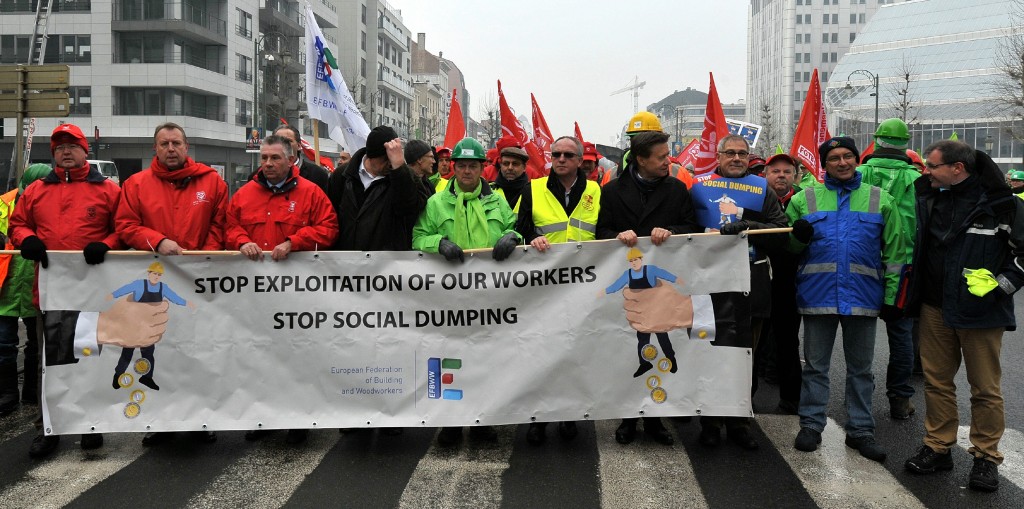
The EU Commission has published new proposals to take action to stop businesses using migrant workers to undercut wages. The proposed ‘Social Rights Pillar’ and an amendment to the Posted Workers Directive – which has previously been accused of allowing the undercutting of domestic workers’ conditions by migrant labour – would legislate against this on a European level.
A new briefing note published by Another Europe Is Possible explains why the proposals would empower ordinary citizens by reducing the ability of multinationals to undercut national employment standards and play states off against each other in order to drive down wages and protections for workers. Whereas Britain Stronger in Europe have previously argued that a British exit from the EU would lead to higher wage costs for business by reducing the migrant labour force, the report argues the progressive case for ‘In’ rests on the view that the Union has an untapped potential to boost working class living standards across the continent.
Academic experts have welcomed the proposals as a modest but real step forward. Steve Peers, a professor of European law at the University of Essex, said:
“The new proposal goes a long way to ending unfair undercutting of national workers’ pay and conditions by workers sent temporarily from other Member States. In particular, it would apply national collective agreements to workers sent from other Member States in many cases, and it would ban undercutting pay and conditions by means of using sub-contractors or sending temporary agency workers from other Member States.”
Steve Turner, the TUC spokesperson for Europe, Assistant General Secretary of Unite and supporter of Another Europe Is Possible, also gave cautious support to the moves, but called for the Social Rights Pillar to be extended to all 28 countries and for the Posting of Workers Directive to cover national collective bargaining agreements, not just minimum legal protections:
“Proposals for a Social Rights Pillar should help to rebalance the EU’s focus away from the unceasing demands of business to those of Europe’s citizens and workers. Those that produce and purchase are desperately looking for arguments to engage positively with the European project – this is welcome but the EU can still do more.
“For the Social Rights Pillar to mean anything for UK workers however the proposal will have to be extended beyond its current scope of the Eurozone countries. A two tier social Europe like a two tier Europe more generally, quite apart from having no positive impact here in the UK, will be used as a tool to drive down workers’ rights and standards across the whole EU, as non-Euro countries compete for foreign investment on the back of more ‘competitive’ labour markets.
“The same can be said of the proposals to revise the Posted Workers Directive. While ending the obscenity of ‘country of origin’ exploitation, the proposals are limited to only ‘national laws and regulations’ – like the minimum wage in the UK. Without its extension to collective agreements agreed by trade unions and employers in a sector, company or workplace, then the proposal will be a missed opportunity.
“Unite, the TUC and other non-Eurozone trade unions will be fighting for changes to both these directives this week in Brussels. For workers to see Europe differently, as a source of hope, security and solidarity between its people, the Commission will need to resist attempts by the UK government and others to exempt themselves from core protections and drive down standards in a ‘race to the bottom’ only benefiting employers and wider corporate interests. We have an opportunity to rebalance and redefine the European project in favour of its citizens. It’s our duty and responsibility to fight to make this happen.”
Sam Fowles, a research fellow in law at the University of Birmingham and Another Europe Is Possible spokesperson, welcomed the move as a clear step forward and challenged the officially designated ‘In’ campaign to support these measures too:
“I hope Britain Stronger in Europe backs these measures unequivocally. For our part Another Europe Is Possible welcomes these steps by the EU commission to end undercutting of wages and conditions, and protect the rights of both migrant and home country workers. Only by ensuring common standards, with robust employment rights, across all member states will the EU be able to demonstrate to workers of all countries the benefits of membership. While these measures still don’t go far enough in protecting migrant and native workers’ from unscrupulous employers, they put paid to the notion that the EU is simply a bosses’ club which is totally unresponsive to the demands of workers.”
22nd March 2016
